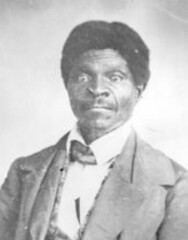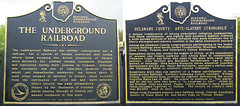The Civil War
A Civil War is a war between opposing groups of citizens from the same country. In 1861, two parts of America went to war against each other. After 4 years, the Union won. Many people died on both sides, and the South suffered terribly.
No one expected the Civil War to be long. It became one of the worst wars in American history.
WAR BEGINS
In April 1861, the Civil War begin at Fort Sumter. The fort belonged to the North, or the Union, but it was in South Carolina-deep in the South.
| 1019430109 | Abolitionist | A person who worked to end slavery. | |
| 1019430110 | Slavery | The treatment of people as property. People who are denied freedom in this way are said to be enslaved | |
| 1019430111 | Secede | separate from Union | |
| 1019430112 | Civil War | The war that divides America in the 1860s. A war between citizens of the same country. |  |
| 1019430113 | Reconstruction | The period of time after the Civil War in which Southern states were rebuilt and brought back to the Union | |
| 1019430114 | Union | During the Civil War, the Union came to mean the government and armies of the North | |
| 1019430115 | Compromise | A way of settling disagreements in which each side gives away a little in its demands (ex. Missouri Compromise, Missouri admitted as slave, Maine as free-kept balance of power in Senate) | |
| 1019430116 | Confederacy | Another name for the Confederate States of America, made up of the 11 states that seceded from the Union |  |
| 1019430117 | Emancipation Proclamation | A special order by President Lincoln on January 1st, 1863 declaring slaves in Confederate sates to be free |  |
| 1019430118 | 13th Amendment | a change to the Constitution (1865) that abolished slavery in US (made it illegal) | |
| 1019430119 | 14th Amendment | a change to the Constitution (1868) granting citizenship to anyone born in the United States and guaranteeing all citizens equal protection of the law | |
| 1019430120 | 15th Amendment | a change to the Constitution (1870) declaring that states cannot deny anyone the right to vote because of race or color, or because the person was a slave | |
| 1019430121 | Kansas-Nebraska Act | Act passed in 1854 that created Kansas and Nebraska territories and abolished the Missouri Compromise by allowing states to determine whether slavery would be allowed in new territories | |
| 1019430122 | State's rights | the rights belonging to various states, especially with reference to interpretation of Constitution | |
| 1019430123 | Battle of Gettysburg | July 1st-3rd (1863) Union leaders defeated General Lee. A turning point battle during the Civil War |  |
| 1019430124 | Dred Scott | former slave who sued for his freedom in the Supreme Court. |  |
| 1019430125 | Abe Lincoln | President during the Civil War |  |
| 1019430126 | Harriet Tubman | She led 300 slaves to freedom, because of her bravery she is the symbol of the Underground Railroad |  |
| 1019430127 | Jefferson Davis | President of the Confederacy | |
| 1019430128 | Ulysses S. Grant | General for the Union, later became 18th President |  |
| 1019430129 | General Robert E. Lee | General for the Confederacy | |
| 1019430130 | Fort Sumter | South Carolina, April 12-14, 1861, start of the Civil War |  |
| 1019430131 | Bull Run | Virginia, July 1st, 1861, first major land battle of Civil War | |
| 1019430132 | Antietam | Maryland, September 16-18, 1862, bloodiest single day in American military history, 23,000 died | |
| 1019430133 | Battle of Gettysburg | Pennsylvania, July 1-3rd, 1863- Union leaders defeated General Lee. Turning point of Civil War. Followed by famous speech by Lincoln to dedicate cemetery. | |
| 1019430134 | Causes of Civil War | slavery and state's rights | |
| 1019499407 | Freedman's Bureau | designed to help former slaves with food, clothing, find jobs, medical care, created schools (established 1865) | |
| 1019499408 | Carpetbagger | Northerns who came to the south for economic reasons after the Civil War-they took advantage of citizens of the south | |
| 1019499409 | Costly | The Civil war was the most costly war in American History in terms of total devastation. |

